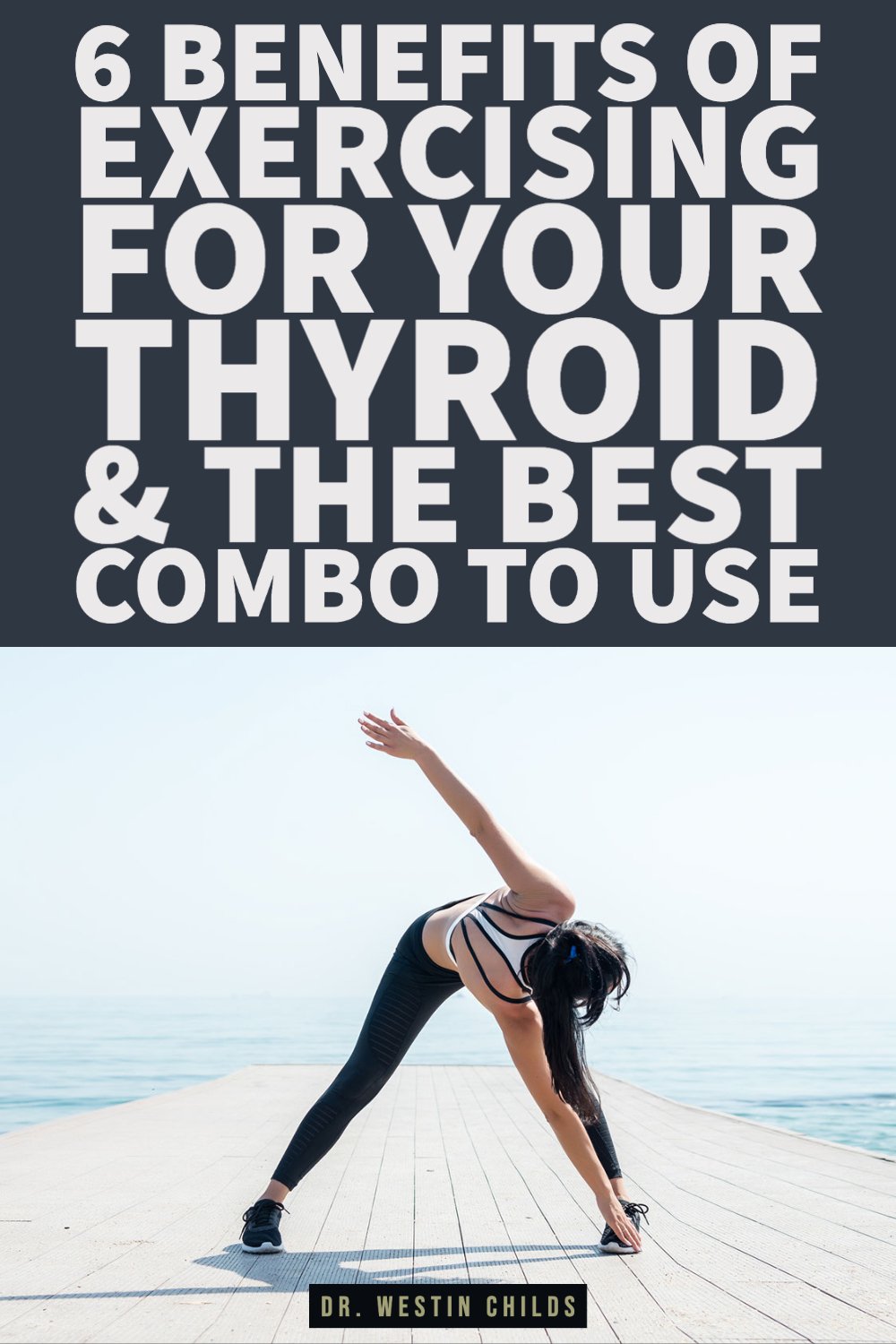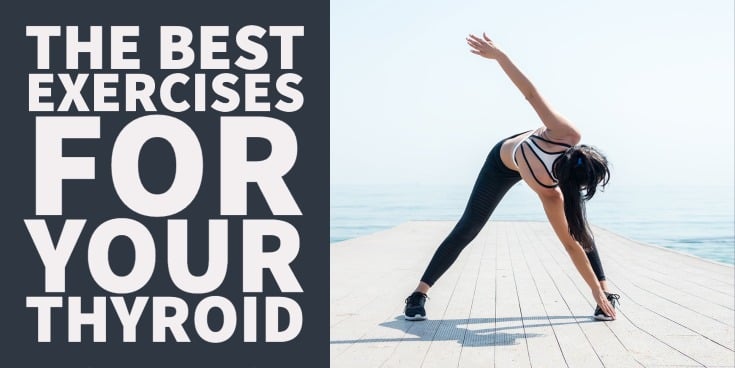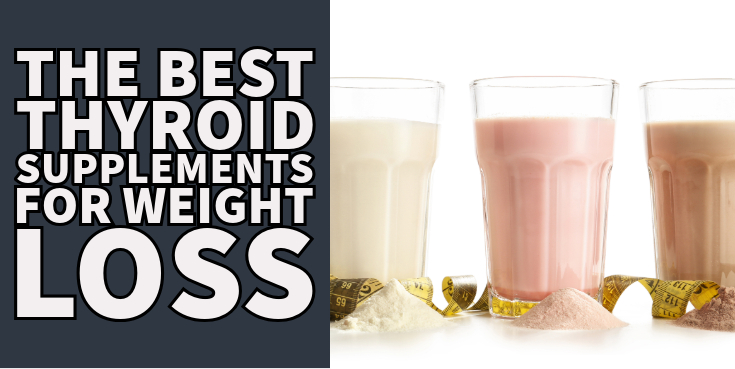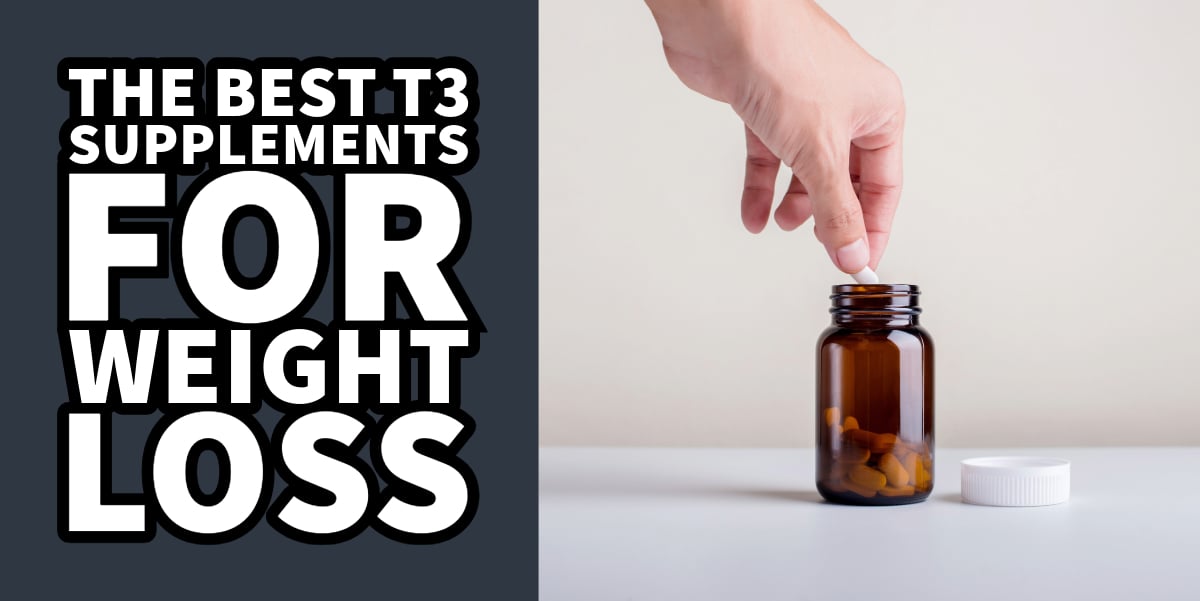Exercise is probably one of the best treatments that you can do for your thyroid and yet it’s something that most thyroid patients completely neglect.
Not only is it valuable for your thyroid but it’s also valuable for your entire body.
I know that some people need to know the why behind things like this, so let’s talk about the benefits first and then I’ll explain the absolute BEST exercises for your thyroid so you can actually obtain those benefits.
And if these benefits aren’t enough to get you to want to exercise, I don’t think anything will!
Benefit #1. Higher free thyroid hormone levels
This is HUGE for thyroid patients.
Think about it this way: why are you taking thyroid medication? To INCREASE your thyroid hormone levels (1).
Exercise is a free (for the most part) way to obtain these benefits and it doesn’t require the use of prescription medications!
The higher your free thyroid hormone levels are, the better your thyroid will function, and the more symptomatic control you will get.
I know it can be hard to exercise as a thyroid patient because of fatigue, but in a paradoxical way, exercising actually increases your energy overall by increasing thyroid function.
Research shows that exercise not only increases free T3 and free T4 but it also…
DOWNLOAD FREE RESOURCES
Foods to Avoid if you Have Thyroid Problems:
I’ve found that these 10 foods cause the most problems for thyroid patients. Learn which foods you should avoid if you have thyroid disease of any type.
The Complete List of Thyroid Lab tests:
The list includes optimal ranges, normal ranges, and the complete list of tests you need to diagnose and manage thyroid disease correctly!
Benefit #2. Reduces TSH levels.
TSH is one of the main tests that doctors use to assess thyroid function and a high TSH is associated with low thyroid function.
So it makes perfect sense that exercise would INCREASE thyroid hormone levels and DECREASE TSH levels (2).
This is just another way of stating that exercise improves the thyroid.
Again, this is huge because it means there’s something else that YOU as a thyroid patient can do to improve your thyroid that doesn’t require a doctor.
Normally, if you want to lower your TSH you’d have to increase your thyroid medication dose.
But you can obtain this benefit with exercise alone and without the need for altering your thyroid medication.
Benefit #3. Weight loss.
If improving your thyroid wasn’t enough to get you to want to exercise then maybe weight loss will be!
Exercise helps thyroid patients lose weight by balancing hormones, including thyroid hormone, increasing lean muscle mass (3), and increasing metabolism (4).
Not only will exercise help you burn more calories but it will also balance those fat-storing hormones like leptin and insulin.
Leptin, in particular, is a big problem for thyroid patients because both fat cells and thyroid hormones regulate it.
The more overweight you are and the more thyroid dysfunction that you have, the more likely you are to be leptin-resistant.
Based on my experience, weight gain is one of the most troubling symptoms that thyroid patients face and the symptom that takes the longest to resolve.
Exercise is one way to accelerate your weight loss efforts and make pretty much any weight loss therapy even more effective.
This includes hormones, medications, and supplements.
Benefit #4. Increased muscle mass & better muscle health overall.
Your muscles are a major target of thyroid hormone action where they regulate thyroid hormone signaling.
When thyroid hormone levels are low, you may start to experience muscle pain as a result.
Exercising helps to increase muscle mass which can reduce muscle pain, improve your metabolism, and overall improve muscle health.
This is also important if you are taking thyroid hormone medication because some of these hormones, like T3, may actually cause muscle catabolism.
Exercising can help offset the effects of T3 thyroid hormone medications like Cytomel and liothyronine.
It will also help with longevity and aging because maintaining muscle mass is key if you want to thrive as you get older (5).
Benefit #5. Improved mood
Thyroid patients frequently have issues with depression, irritability, and anxiety which can cycle back and forth.
Consistent exercise helps you feel happier and makes you more tolerant of negative situations.
In other words, it doesn’t force you to be happy but it makes dealing with the stressors of everyday life a whole lot easier.

This means it’s far more likely that your mood will be balanced.
It also can treat issues like brain fog which, again, many thyroid patients suffer from.
So whether it’s mood, brain fog, or fatigue, exercise helps.
Benefit #6. More consistent bowel movements
Believe it or not, exercise has been shown to treat constipation which is a problem that many thyroid patients suffer from.
When thyroid hormone levels are low, bowel movements decrease and you develop constipation.
If you’ve ever been constipated, you know that this is not a feeling you want to have stick around.
Exercise increases lymphatic flow and can sort of act to massage the intestines which promotes the emptying of the bowels.
The result is more frequent bowel movements and a better quality of life.
And, finally…
Benefit #7. A reduction in inflammation.
Obviously, you don’t want inflammation in your body in any way shape, or form but it’s especially harmful for thyroid patients because it impacts thyroid gland health and T3 levels.
Inflammation reduces T4 to T3 conversion which lowers T3 levels in the body and promotes thyroid gland damage in those with Hashimoto’s or Graves’ disease.
Exercise is an excellent treatment for hypothyroidism but also for all forms of autoimmune thyroid disease because of this.
How to Exercise Specifically For Your Thyroid
It’s pretty clear that exercise is beneficial for thyroid patients so the question is not whether should you exercise but rather how should you exercise.
And there are several different ways to think about this:
The first is with intensity.
Based on available research, thyroid patients get the biggest boost to thyroid function when exercising at 70% of their maximal heart rate (6).
I’ll teach you how to calculate this rate in just a second so stay tuned but for now, let’s go back to exercise.
This level of exercise is right at the cusp of moderate to vigorous based on the American Heart Association guidelines.
Basically, exercise between 50% to 70% of your maximal heart rate is considered moderate and 70-85% is considered vigorous.
Even though you get the MOST benefit at this 70% range for your thyroid, the reality is that you are still getting benefits at levels below 70% and at levels higher than 70%.
But there is a point at which these benefits decline and at which they may start to harm your thyroid.
And that level appears to start at around 90% of the maximal heart rate for conditioned athletes.
At this level, athletes started to see a decline in their T3 thyroid hormone levels, both free T3 and total T3.
This is very important because if you are a non-conditioned athlete, especially one with thyroid problems (like those reading this article), you will most likely start to see these negative effects at lower levels of intensity.
These higher levels of intensity, like 80%+ or higher or maximal heart rate, typically require high-intensity interval training to obtain.
For this reason, it’s generally a good idea to avoid high-intensity interval training as a thyroid patient at least when you are first starting out.
If you’ve been exercising for a long period of time and your body is already accustomed to HIIT training then you can keep doing it.
But if you are someone who is just starting out, it would most likely be best for you to start out at an intensity of around 40 to 50%.
This is because, again, you really don’t want to do anything to lower your T3 levels and you want to give your body some time to acclimate to these new levels.
Remember:
Thyroid patients tend to just be a little more fragile compared to the average population so it’s always best to start out low and go slow.
The worst thing you could do is start out at an intensity level that is higher than your body can manage which causes a decline in thyroid hormone and disrupts other hormones in your body.
How To Measure Your Maximal Heart Rate
Now, remember when I said I was going to teach you how to measure your maximal heart rate? Well, let’s do that right now:
It’s really easy to do. All you need is to subtract your age from the number 220 and this value will be your maximum heart rate (7).
From there, you just take a percentage and multiply it by that number to get your desired intensity.
So, for instance, if you wanted to measure out 70% of your maximal heart rate you would take 220 minus your age, and then multiply that number by 0.7 (which is 70%).
For me, at age 37, 70% of my maximal heart is 128 and I know from experience, that I can get pretty close to that level just by lifting weights.
You can easily calculate 50% or 70% of your own maximal heart rate using some simple math.
From there, it’s just a matter of paying attention to your heart rate with a cheap wearable device as you exercise.
The Best Type of Exercise For Thyroid Health
The next way to think about exercise is related to the type of exercise.
And here we have endurance, aerobic, strength training, flexibility, mobility, and so on.
For a thyroid patient, the absolute best combination of exercises will be aerobic training plus strength training (8).
The aerobic component because that’s just the easiest way to get your heart rate to the desired intensity level.
And the strength training component for its benefits on muscle mass, metabolism, bone health, and longevity.
And when I talk about strength training, we’re not talking about bodybuilding levels of intensity here.
All we are really talking about is added weight beyond your own body weight and beyond the force of gravity.
Believe it or not, a few extra pounds can go a long way to helping you build muscle mass and protect your bones even if it’s just 5 to 10 pounds.
A good sample exercise routine would be something like 1-2 days a week of strength training and 3-4 sessions of aerobic exercise with a goal to get your heart rate to the 50% to 70% range.
And remember, when it comes to your heart rate, it doesn’t actually matter how you get it there.
If you can get your heart rate to that 50% to 70% range with yoga, then go for it, if you prefer a brisk walk/jog, or biking, or swimming, or whatever, it doesn’t matter so long as your heart rate gets to that level and stays there for at least 20-30 minutes.
Managing Your Thyroid Symptoms So You Can Exercise
Another consideration for thyroid patients who want to exercise is thyroid symptoms.
As you know, thyroid patients frequently suffer from symptoms like muscle pain, joint pain, and fatigue all of which can make exercising much more difficult.
So, if that’s you, and you aren’t sure where to start, or it’s difficult to start, then just start with walking.
Even moving the big muscles of your body for 20-30 minutes per night will have a positive impact on thyroid function and cortisol.
The amazing thing about your body is that it’s adaptive so as long as you are putting a small amount of pressure on the body, it will adapt and you will become stronger.
We’re not running a sprint here, we’re running a marathon.
So make sure whatever exercise you do, it’s something that you can be consistent with for a long time.
Final Thoughts
Exercising is one of the easiest and fastest ways to improve your thyroid and it’s a therapy that not enough thyroid patients are taking seriously.
Not only is it important for your thyroid but it will have all sorts of profound benefits on your entire body.
While exercise is incredibly important for supporting your thyroid, it’s not the only thing you should be doing.
Make sure you are also taking advantage of eating a whole-food diet, getting enough sleep, taking the right supplements, and managing your stress.
If you really want to see life-changing results, combining all of these treatments together is the way to do it.
Now I want to hear from you:
Are you someone who is consistent with exercise? If so, how often and what types of exercises are you doing?
Are you planning on getting started with exercise after reading this?
Did any of the benefits listed above surprise you?
Leave your questions or comments below!
Scientific References
#1. ncbi.nlm.nih.gov/pmc/articles/PMC6678003/
#2. ncbi.nlm.nih.gov/pmc/articles/PMC9258892/
#3. ncbi.nlm.nih.gov/pmc/articles/PMC4836564/
#4. ncbi.nlm.nih.gov/pmc/articles/PMC3925973/
#5. ncbi.nlm.nih.gov/pmc/articles/PMC4035379/
#6. ncbi.nlm.nih.gov/pmc/articles/PMC6678003/
#7. cdc.gov/physicalactivity/basics/measuring/heartrate.htm
#8. ncbi.nlm.nih.gov/pmc/articles/PMC9365113/










Hi, I’m inconsistent when it comes to exercising. I need to concentrate on stretching. I do walk videos in the house. I had a shoulder replacement on my right arm this past January and have bone on bone on my left, which is hurting. I had laminectomy surgery on my back in Oct 2021. I’m 60 and sometimes I feel great my lower half and then sometimes my knee. The pain I had prior to surgery for my back restricted exercises; therapy helped a little before surgery and back is much better, however the shoulder pain causes no weight on the arm in the past and still. I had a physical job in a factory on concrete floors for 33 years and sometimes I wonder if it’s the thyroid. I know inflammation can cause pain. Getting started is the hardest. I take B12 supplements because of pernicious anemia, so I know fatigue and it’s not that. I don’t think, but now that I found you, I’m so happy and ordered the supplements last night. I’m thinking I have leptin resistant. I got the other bundle for RAI though. I’ve been taking levothyroxine since 14 with adjustments from doctors and they didn’t know biotin affects lab test. Another specialist told me recently, but she said there is no special diet for hypothyroidism I was diagnosed with graves disease and had the goiter. I was different in school, grades, handwriting changed and eyes bulge, body temperature. I’m so happy my eyes went back to normal and my weight, but now weight loss is tough. I know metabolism slows as we age, but I like to blame my thyroid . I am sorry for the long text, but I’m glad I stumbled across your videos on YouTube. I’m looking forward to a change. I’m not suffering like some of the others. I eat whole foods 90% of the time and cook and use healthy oils and avoid fake foods. GMOs, artificial foods and flavors and artificial sweeteners, high fructose and soybean oils. I do sometimes get cravings for sweets and fruit usually satisfy, but not always, when not available if out of season and sometimes I feel like I don’t get full, but not always; up and down. I’m done. By the way, my doctor told me in May, that I don’t need to have any of those other test for my thyroid. I often wonder about my prescription. My labs are like a yoyo, up and down. Thanks and take care.
I’m not a doctor but a thyroid patient for 35 years… YOU have to advocate for yourself because your Big Pharma trained doctor knows NOTHING. FIRST- SWITCH to Dessicated Thyroid (like Armour or NP)- you’ll have to INSIST- but I PROMISE, it’ll change your life! It’s worked for EVERY person I’ve ever told… within a WEEK of switching from Levothroid I felt like the old me! It took me 10 years to be brave enough to insist my doctor prescribe it.
Dr Weston, I’d love to hear if you agree with me.
Please recommend the best exercises for people who had undergone thyroidectomy and are now on thyroid hormone FT4 replacement. Please especially explain what to avoid and what to pay attention to.
Hi Denise,
The information in this article applies to those without a thyroid.
I have subtracted my age 61 from 220 and multiplied itby 0 5 which equals 189.5 – does this seem right.
If I were to try weights, how much should I start off using. Tia
Hi Jane,
If you were trying to get 50% of your maximal heart rate the math would look like this: 220 – 61 = 159 x 0.5 = 79.5.
70% of your maximal heart rate would be 220 – 61 = 159 x 0.7 = 111.3.
Off topic but do you have a way to eliminate parasites?
I’d also love to know, Dr. Westin! (If you do!)
Hi, I’ve been an avid CrossFit athlete for 14 years. I’ve recently read many papers on avoiding hiit type of exercise as women age. So this is one more reason to avoid it. But I LOVE it and I’ve cut back from 5 days to 3 days with the other 2 days lifting only. But if it’s really that bad I feel like I need to step away. Also my max heart rate is way higher than the 220-52.
Hi Kristie,
Even though some people may recommend against excessive HIIT, there will always be exceptions to the rule. It’s hard to apply general information at the individual level, just like it’s difficult to provide personalized information to thousands of people with one article or paper. It’s best to use trial and error to find what works best for your body and stick to that.
I am 75 years old so my maximum heart rate is 145; consequently, 70% of that is 101.5. My heart rate can go above that while gardening, going to the grocery store, etc. Almost anything I do is going to be above 50% level. My resting heart rate is about 58. I am on blood pressure medicine. Should I be concerned about the fact that my heart rate goes above 70% so easily? Thanks for your help.
Hi Patti,
Are you taking other medications that impact your heart rate? It sounds like there’s something else at play that is impacting your heart rate or your sympathetic nervous system.
I’ve been exercising for many years and found a particular routine that is easy, not boring, and provides both interval aerobic exercise and strength training, and all at a level that is comfortable, whether you’re a frequent exerciser or do it randomly. I carry a hand weight (or rock) in each hand that weighs between 2 and 5 lbs. I clip a countdown timer set to beep every minute (Gym Boss is the one I bought from Amazon) on my shorts and alternate jogging for a minute, with walking for a minute, and during the walking, I alternate between overhead presses, raising my arms to the side, straightening my arms out to the back (for triceps) and bicep curls. This process allows me to get my heart rate up to the desired level but also gives my upper body a workout at the same time. I do core exercises separately, but with this single exercise I can work out most of my muscles!
Hi Elsa,
Glad you found what works for you! Thanks for sharing.
So what do we do if we can hit our 70% heart rate with just basic movement (mine should be 124)? (Meaning my heart rate is there with just walking and therefore functioning at a much higher rate most of the time). I walk 3x a week and weight lift 2x a week with heavy weights, where I easily hit 145-159 bpm. I don’t know how to keep it in the 70% range, as it peaks higher from minimal exertion.
Hi Heidi,
What is your resting heart rate?
I just had my thyroid removed in October of 2022 and I have struggled with all kinds of side affects from the thyroid medication, little by little I look things up about thyroid disease in my free time, and I now take T2, T3, and T4 as a way to help me feel better overall and to not have too many symptoms. And I have a Peloton, so I try to ride 3-4 times a week in combination with walking in my neighborhood when I can, and lifting weights 2-3 days a week as well. While I haven’t actually seen any change on the scale yet, I’m just going off of how I feel. I think I have lost inches, which is something! So just stating positive that the scale will get there eventually!:)
Hi Tessa,
Losing inches is a great sign and it means you are definitely heading in the right direction. When it comes to losing weight after thyroid removal, thyroid optimization is critical. If you don’t think your thyroid medication dose is optimized, I would recommend reading this article: https://www.restartmed.com/how-to-optimize-thyroid-medication/
I have always exercised but about six years I went for my yearly thyroid check ( I had a partial thyroidectomy about thirty years ago and have never taken medication) The tests showed I was hypothyroid . I asked the doctor to give me 6 weeks . I ate very healthfully , did HIIT classes 3x week and managed to get into a normal range in that time
Hi Sharon,
Great job! Your story highlights how powerful exercise can be for improving thyroid function.
With hypothyroidism and rheumatoid arthritis, exercise is so important to me in managing symptoms. As one doctor said to me: ‘motion is lotion’.
I walk, run, lift low-medium weights, and do a range of classes from combat workouts and HIIT, to yoga and Pilates. I’m not perfect – probably because I aim for moderation rather than 100% good in my diet – but the mental effects of exercise are so positive that I make it part of my daily life.
Hi Jax,
I agree 100%. It’s all about finding what you enjoy and what you can stay consistent with. It’s far better to do less intense workouts, but continue doing them for longer, than to burn out on HIIT workouts within a few weeks.
Hello, I recently read your article on exercise recommendations for individuals with thyroid issues, and I found it both interesting and valuable. I have had my thyroid removed, and I’m curious to know if the exercise advice you provided in your article applies similarly to individuals like me who no longer have a thyroid. Could you please clarify if the exercise guidelines are suitable for both thyroid patients and those who have undergone thyroidectomy? Your insights would be greatly appreciated. Thank you.
Hi Adil,
Yes, this information still applies to those without a thyroid.
I walk 10k-12k steps a day and currently lose a pound every 2 weeks. When I was doing 17k-20k a year ago I was frustrated because I seemed to slowly be gaining weight. I think I have found my “sweet spot”. I intend to lose another 3 lbs and hold which will put me at 63” and 120lbs which is where I feel my best.
I have Hashimotos and have been on a roller coaster with my meds, but I think it has stabilized now.
Hi L K,
Glad you found what works for you! Thanks for sharing.
Thanks for this info- I am wondering if my resting heart rate is a bit high because of the T3 I take? (I take 15mcg a day plus 90mg Thyroid NP). At age 42, 70% for me is 124, and I’m barely getting warmed up and I’m already there. My resting heart rate used to be lower, but now it’s in the 70s or 80s consistently. I haven’t seen a difference in my recent sudden weight gain of 10lbs whether I exercise at 124 or 175 bmp. My recent T3 test showed me at 3.8 on a scale of 2.5-4.3, and my RT3 was 9.4. Am I overmedicated, or just out of shape, lol? Thanks!
Hi Eryn,
It may be possible that your dose is too high, yes. I would recommend reading this article for more information: https://www.restartmed.com/thyroid-related-health-metrics/
Hi, great article! If you’re starting out to exercise more intensely after and you’re aiming for 40 to 50 percent of the maximum heart rate for your age, how can you tell when you can increase your activity? Just lower value overall but as the lady above said it could be medication etc.
Hi Sash,
It’s related to tolerance. Your body will adapt slowly to whatever stimulus you add to it so after a few weeks, you can slowly begin to increase either in duration or intensity. Depending on your age and existing medical conditions, though, you may want to touch base with your doctor. I’m not able to give you personal medical advice, just general information.
I too switched to Armoroid from the Levo ‘whatever’ it was. Do feel some better. I am 83, still work 4 hours a morning, up and down and walking in my job. I wait on people, do book work etc. I don’t excercise hardly at all, I am in need of knee surgery within the next 6 months probably. Hard for me to walk after being on concrete every morning. but I plan to start walking a little each day with spring coming. I have arthritis all over in my joints esp. I do seem to have gut problems off and on and some days tired. I anxious to try this supplement I just ordered from you. Do I still take magnesium?
Hi Pat,
Can you please let me know which supplement you purchased? If the supplement doesn’t contain magnesium then you will likely want to consider taking some given its importance for thyroid function.
I get the fatigue and weight gain really bad when my thyroid level is off. Oftentimes, even walking is draining to me. I like to do Tae Bo, but it is a really vigorous workout–something you work up to, not something to start with. We just got it back in line, but I am still waiting for the weight loss to come and looking for a gentle activity to start with.